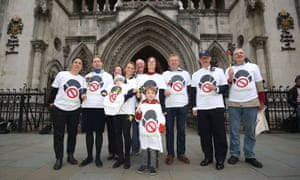Ministers are coming under growing pressure to remove tax incentives for diesel cars and offer compensation to motorists so they can swap to more environmentally friendly vehicles.
A group of medical professionals, environmental campaigners and lawyers has written to the chancellor ahead of the budget to demand a change to the vehicle excise duty that they say subsidises diesel cars.
Separately, senior Labour and Tory politicians have called for a comprehensive vehicle scrappage scheme to help people with diesel cars change to greener alternatives.
The letter from campaigners, including the British Lung Foundation, Greenpeace and doctors’ groups, says toxic air poses a daily risk to people’s health – particularly the young and those suffering from lung problems.
“Air pollution has … been shown to stunt children’s lung growth, which could leave them with health problems in later life,” it states. “We all deserve to breathe clean air.”
On Saturday the Guardian revealed that thousands of children and young people at more than 800 nurseries, schools and colleges in London faced dangerous and illegal levels of toxic air, much of it from diesel cars.
The transport secretary, Chris Grayling, indicated the government may bow to pressure, saying motorists should be wary of buying diesel cars, adding: “We’re going to have to really migrate our car fleet, and our vehicle fleet more generally, to cleaner technology.” However, he said that diesel “was not going to disappear”.
Air pollution causes 40,000 early deaths in the UK and costs the country £27.5bn a year, according to a government estimate. MPs have called it a public health emergency.
The letter adds: “We know diesel vehicles, in particular diesel cars, are a major source of pollution in towns and cities … yet vehicle excise duty (VED) not only fails to recognise this, but is still incentivising them. We are therefore asking for a revision of the VED first-year rate in your upcoming budget statement.”
Sadiq Khan, the mayor of London, has added his voice to calls for a change in vehicle excise duty for diesel cars. He also said the government should introduce a comprehensive clean air act and a diesel scrappage scheme to compensate those motorists who bought diesel cars after being told they were more environmentally friendly.
“A number of years ago Londoners and others around the country were encouraged to buy diesel cars, businessmen and women, charities, families were all encouraged to buy diesel.
“We are saying to the government you need to choose a national diesel scrappage fund to help people move away from diesel … and we would target this to the poorest families.”
Judges told ministers last November they must cut the illegal levels of nitrogen dioxide (NO2) in dozens of towns and cities in the shortest possible time after ruling that their plans to improve air quality were so poor they were unlawful.
The government has until April to come up with proposals to bring before the court.
Last year the environment, food and rural affairs select committee described the situation as a public health emergency and recommended the government introduce a diesel scrappage scheme.
Its chair, Neil Parish, told the Guardian he was disappointed that the advice had been ignored and called on the government to change course.
Parish said: “Defra has lost again in the courts on its failure to tackle air pollution. The option of a scrappage scheme should be back on the table to help get the dirtiest diesels off our roads quickly.”
He said it was vital any scrappage scheme was “focused and does not merely become a subsidy for the middle classes. Cash from the scheme should either promote ULEVs [ultra-low-emission vehicle] or incentivise public transport use.”
Legal NGO ClientEarth brought the case against the government and was one of the groups to sign Sunday’s letter to the chancellor.
Its chief executive, James Thornton, said: “The high court has ordered the government to take immediate action now to deal with illegal levels of pollution and prevent tens of thousands of additional early deaths in the UK.
“The government needs to recognise that diesel is the primary cause of the problem, and to promote a shift to alternatives. It’s perverse that our tax system encourages people to buy dirty vehicles.”
End UK tax incentives for diesel vehicles, ministers are urged
